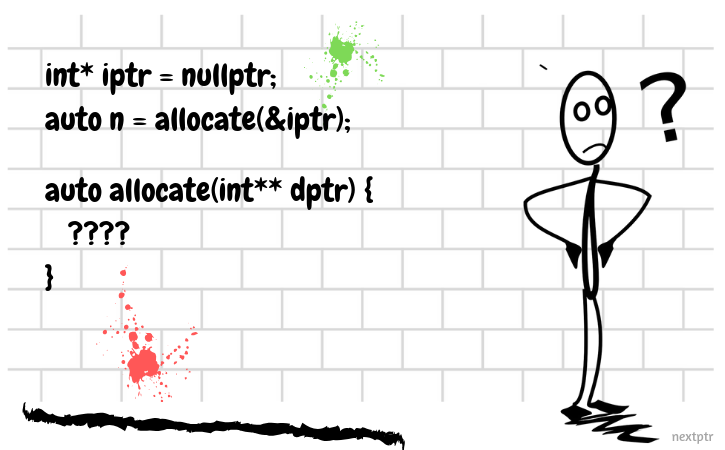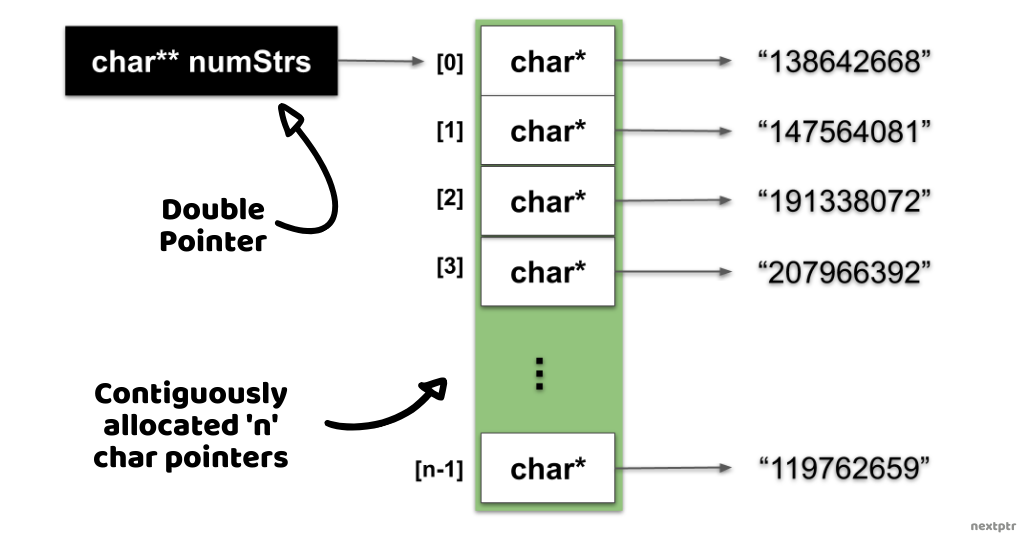

What is a double-pointer?
A double-pointer is a pointer to a pointer. For instance, a char pointer to pointer is declared as char** ptrptr.
Let's look at a real-life example of using a char double-pointer. In the following code, the function genNumStrings() returns a dynamic array of variable length number strings ("12345", "2345666", "12133131", ....). The genNumStrings() generates a given 'n' number of strings using the random number generator and fills them in a dynamic array of char pointers (char*). The dynamic array of char* itself is nothing but a double-pointer char**, as shown below:
//Returns a list of 'n' random number strings.
//Each number string is of a random length.
char** genNumStrings(size_t n) {
//Create a dynamic array of char*
//numStrs is a double-pointer
char** numStrs = new char*[n];
//seed the random num generator with current time.
std::srand((uint32_t)std::time(nullptr));
for(size_t i=0; i < n; i++) {
//Create a random number string
char str[10];
std::snprintf(str, sizeof str, "%d", std::rand());
//Allocate memory for one number string
//Store the char* pointer in the numStrs array
numStrs[i] = new char[std::strlen(str)+1];
//Copy the number string to the dynamic location
std::strcpy(numStrs[i], str); //safe
}
//Return char** double-pointer
return numStrs;
}
The following illustration shows the memory layout of the dynamic array returned by the genNumStrings():

The memory allocated by genNumStrings() can be freed by the function freeNumStrings(), as shown below:
//Frees the memory of all strings (char*)
//and the char**.
void freeNumStrings(char** numStrs, size_t n) {
//First free all the char*
for(int i=0; i < n; i++)
delete [] numStrs[i];
//Now free the char** itself
delete [] numStrs;
}
Both of the above functions can be used as:
int main() {
auto numStrs = genNumStrings(10);
//Print all strings
for(int i=0; i < 10; i++)
std::cout << numStrs[i] << "\n";
//Free
freeNumStrings(numStrs, 10);
return 0;
}
Having looked at the basics of the double-pointer, let's look at another example and a question in the next section.
A Question
In the following code, an int pointer is dynamically assigned memory for a variable number of ints through a function allocate:
int* iptr = nullptr;
// allocate memory
auto n = allocate(&iptr);
Once allocate returns, the iptr points to a memory location that holds n number of ints as shown:

Below is the partial implementation of function allocate. It accepts an int** as an argument and returns the number or count of ints for which the memory is allocated:
auto allocate(int** dptr) {
size_t count = getCount();
/*__Allocate Memory__*/
return count;
}
The function getCount above, which is not shown here, could be a function that reads from a database and returns the count of ints for which the memory is to be allocated. You have to select one from below choices that correctly allocates memory (or replaces /*__Allocate Memory__*/) in function allocate above (check Explanations for details):